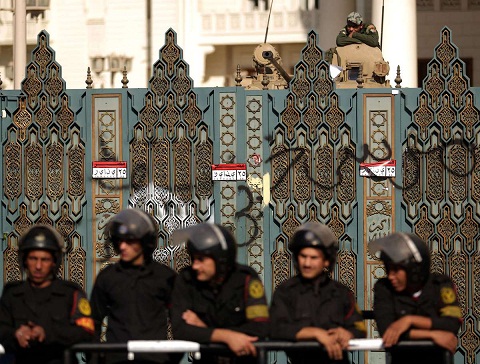This week marks the first anniversary of the death of Egypt’s greatest filmmaker Youssef Chahine, and a series of events were organized to honor his matchless legacy.
The city of Alexandria honored its greatest modern champion appropriately.
Last Monday, a service was held in his memory at the Roman Catholic Church of Alexandria. Meanwhile, the Alexandria city council decided to name a street after Chahine as a tribute to his accomplishments.
Alexandria’s governor, local politicians, friends and family attended the event. In the evening, a seminar discussing his life in film was held at the Bibliotheca Alexandria, hosted by revered critic Samir Faird.
In the Moroccan city of Khouribga, the 12th African Film Festival organized a special seminar for Chahine.
For more than half a century, Youssef Chahine was the Arab world’s most important filmmaker, the poster boy of Egyptian cinema and a world class artist. Throughout most of his career, he split audiences and engaged minds.
Chahine attempted to bridge Egypt’s cinematic traditions and mannerisms with western attitudes and culture.
Brought up in the then-cosmopolitan city of Alexandria in the first half of the 20th century, he was torn between two worlds. The nature of his boyhood culture conjured the central theme of his movies: the identity crises, or the search for one thereof.
In his life-long career, Chahine created some of the most iconic characters of Egyptian and Arab cinema: the detested cripple Qinawy in “Bab El-Hadid (Cairo Station, 1958), Djamila Bouhired, the most powerful female fighter of the 20th Century, in “Djamilah (1958), the struggling peasant Abu Sweilam in “Al-Ard (The Land, 1969), and the defiant Muslim philosopher Averroes in “Al-Massir (Destiny, 2007).
Chahine’s rise to fame came at the height of Egyptian cinema’s golden age in the 1950s. He discovered Egypt’s legendary actor Omar Sharif and cast him in several of his earlier movies.
Chahine was widely known as the “Fellini of the East; a title he duly earned for his later autobiographical works that saw him, like Fellini, delving into fantasy and surrealism. His style, nonetheless, was distinctive, creating a body of work strongly attached to its surroundings.
The unanimous overdue acclaim he received in his home-country masked the fact that for the larger part of his career, Chahine was quite a controversial figure. In 1973, his film “Al-Asfour (The Sparrow) was banned for two years for criticizing the corruption of the Nasser regime. In 1991, he was accused of tarnishing Egypt’s image abroad with his largely unseen docu-drama “Al-Qahira Menauwwara bi Ahlaha (Cairo as Told by Youssef Chahine). His last picture “Heya Fawda? (Chaos, 2007) was released after months of quarrels with the censorship for touching upon torture practices used by Egyptian police.
Although Chahine’s movies were infused with scathing critiques of both the Egyptian society and the government, his passion for life is evident in his works. More often than not, he weaved elements of musicals into the fabric of his realist works. Indeed, singing and dancing was integral – if not pivotal – to all his movies, be it in the 13th century Andalusia of “Al-Massir (Destiny, 1997) or the cholera-stricken impoverished Cairo in “Al Yaum As-Sadis (The Sixth Day, 1986).
Few Egyptian filmmakers have displayed the kind of close kinship to their birthplace that Chahine had with Alexandria. The coastal city was not only his hometown and burial place; it served as the engine for his autobiographical quadrilogy (“Alexandria Why, “An Egyptian Story, “Alexandria More and More, “Alexandria, New York ).
To this day, many of Chahine’s films carry a timeless quality and are still widely popular. The groundbreaking “Cairo Station is still regarded as a milestone in the world of cinema. Voted as one of the top five greatest Egyptian films of all time, “Cairo Station contains all of Chahine’s hallmarks: melancholia and joy juxtaposed side by side, the pain of alienation and the hunger for life, the blend of western sensibilities with inherently Egyptian themes.
A year after his passing, one question remains unanswered: What comes after Chahine? Despite the recent surge in extravagant productions and the focused efforts to market Egyptian films abroad, no other Egyptian filmmaker has managed to acquire the unique international cachet that Chahine employed to lift Egyptian cinema out of obscurity starting from the 50s.
Many of his students and followers found it difficult to step out of his shadow or avoid comparing their work to his. Among Chahine’s most prominent protégés are Asmaa El-Bakry, Emad El-Bahat and Nadia Kamel. The highly successful and equally controversial Khaled Youssef – co-director of “Choas – is regarded by numerous scholars and critics as Chahine’s heir.
However, it’s Youssri Nasrallah who has managed to preserve and develop Chahine’s traditions with six internationally acclaimed films that made him a darling of both the French and the international art-house film community.
Youssef Chahine never grew tired of communicating his love for life and his people. His movies engaged viewers and pushed them to revolt against apathy. He redefined cinema for Egyptian audiences, opening up new horizons for subsequent filmmakers. Despite the occasional aesthetic difficulty of his movies, his relentlessness to confront and criticize and his fear for the future of this country, his films always radiated with hope, and that is his most enduring legacy.
